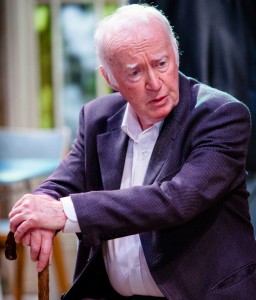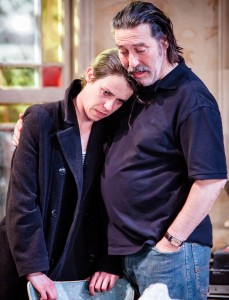The bleakness that often characterizes Irish dramatist Conor McPherson’s work is tempered by the climactic scene in his new play, The Night Alive, which is being presented at the Atlantic Theater Company, a venue during the last decade for his plays Port Authority and Dublin Carol. As fans of the Irish author know, McPherson embraces using supernatural elements that often carry a sense of dread — or worse. In The Weir (1999), a group of people in an Irish pub tell ghost stories to pass the time, but the most vivid one sends chills up the spine. Shining City (2006) featured a scene that had audiences screaming and jumping out of their seats. The hero of The Seafarer (2007) chances an ultimate high-stakes poker game with the Devil.
That sense of real evil in the world is largely subdued in McPherson’s new play, The Night Alive, which has transferred from the Donmar Warehouse in London under the author’s direction. Although the supernatural element is neither so flashy nor so chilling, it is there, but it is used for a very different effect. As usual, too, McPherson portrays modern Ireland with sympathy and clear eyes. Poverty, struggle, drink, stupidity and violence are part of the picture, but so are compassion and unexpected kindness.
As the play opens, the middle-aged Tommy (a scruffy Ciarán Hinds) has brought a young woman named Aimee (Caoilfhionn Dunne) to his home, a room of extraordinary chaos in a rambling old house (superbly designed by Soutra Gilmour, as are the costumes). Aimee's nose is bleeding from a beating; Tommy has rescued her. Soon they are joined by Michael McElhatton’s slow-witted Doc, a chum of Tommy’s who has been tossed out of his sister’s flat where he’s become an unwelcome guest. Doc hopes to bunk at Tommy’s for the night, but Aimee has been offered the extra cot. Though Tommy resists letting Doc stay, he eventually relents.
Tommy finds himself attracted to Aimee, but her past brings him trouble. Doc has heard that she is “on the game,” and Kenneth, her pimp, played with a vicious and unbalanced élan by Brian Gleeson, eventually shows up.
Adding to the pressures on Tommy is his uncle, Maurice, who owns the house and, from his Catholicism, disapproves of Tommy’s friends, slovenliness and separation from wife and children. Jim Norton, an indispensable part of McPherson’s best plays, invests his character, who is alternately bullying and empathetic, with elegance and a flailing loneliness.
McPherson's writing is tight too; it takes only Doc's lingering hand on Tommy's shoulder to raise a suspicion that he's homosexual, and only a couple passing references to cement the fact. As the troubles sort themselves out, there is welcome humor, notably an exchange in which Doc tries to explain to Aimee the evolution of his nickname from “Brian” to “Bri” to “Doc” because the last is shorter than "Bri." There’s nifty low comedy, too, when Maurice, who knows someone is stealing his vegetables from his garden, stumbles across a bag of turnips and overlooks a much more shocking discovery because of his fixation.
Nonetheless, a deep-seated darkness looms throughout. Aimee explains to Tommy that she stayed with Kenneth because she always figured suicide was an option. And the devout Maurice confesses to Tommy: “There’s even days when mass just takes you nowhere, just deposits you back on the pavement, just another invisible man, knowing that the end is sneaking in on you and knowing it’s gonna be the worst part of your life.”
The linchpin of the play is Tommy, and Hinds mines the richness of the character — Tommy tries to cheat Doc and belittles him, but fundamentally cares about his friend and habitually looks after him. It’s a portrait of the way poverty can force decent people to flirt with injustice. But after all the anguish and scrambling and bickering in the characters’ day-to-day existence, McPherson embraces something new for him: a sense that good can win out with perseverance. It's a big step forward for the author, who in the last decade has brought his near-fatal alcoholism under control. As so often in literature, it’s Doc, the “holy fool,” who articulates the truth; his speech in the last moments of the play sets up the surprisingly mundane vision of paradise in McPherson’s brave new work.
The Night Alive plays at the Linda Gross Theater, 336 West 20th St., through Feb. 2. Evening performances are 7 p.m. Tuesday and Sunday and 8 p.m. Wednesday through Saturday. Matinees are at 2 p.m. on Saturdays and 3 p.m. on Sundays. Tickets are $65 and are available by visiting atlantictheater.org.



